If you’re a West Coast rap fan, you may have noticed that a new DJ Quik album appeared on Spotify in December. It might have popped up in your Release Radar, the weekly personalized playlist of new music from artists you already listen to, or maybe you saw it on Quik’s verified Spotify profile. Either way, the moment you hit play you would have realized: This is fake as hell!
For one thing, the vocals are in Spanish, a language DJ Quik doesn’t rap in. The 22 tracks are listed in alphabetical order, starting with “3en1” and ending with “Zombies”—a strange choice. The album cover doesn’t show Quik’s face, though most of his albums do. The copyright at the bottom of the album’s page attributes the record to “Dj Quik” instead of a record label. Finally, you have ears: You know what DJ Quik sounds like, and this isn’t DJ Quik, no matter what Release Radar says.
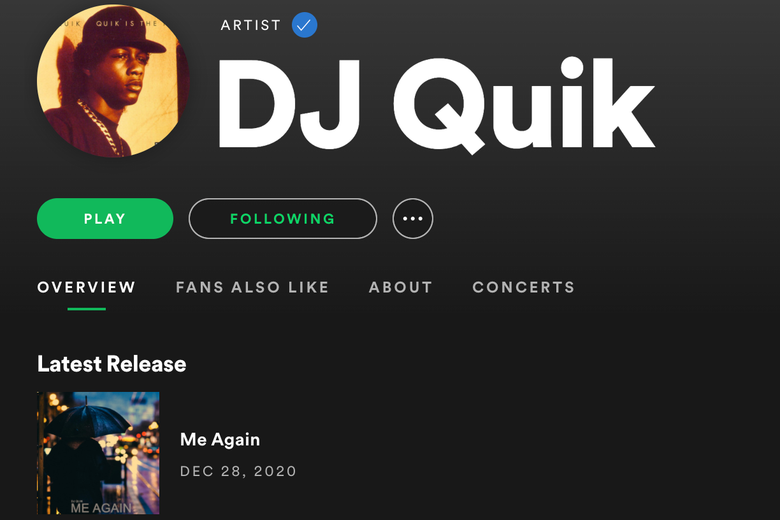

This happens a lot on Spotify, which features music from more than a million artists, some of whom share the same name. These musicians usually have distinct profile pages—but sometimes doppelgangers creep into the discographies of already-established artists in a suspicious-looking way. And I’ve begun to wonder whether some of these doubles are doing it on purpose.
The fake DJ Quik didn’t last long. The new album was removed from the real rapper’s page within a few weeks. It’s possible a fan reported the issue to Spotify, which also helps creators quickly deal with logistical troubles caused by other artists with the same name. But the restoration of order didn’t erase the feeling that inside Spotify’s borderless musical landscape, you’re never more than a playlist transition away from a fake-out—that there’s always someone trying to game the system.
Electric Light Orchestra is the English band best known for ’70s anthems like “Mr. Blue Sky” and “Evil Woman”—right? Wrong. One of my ELO-loving editors noticed in November that Spotify briefly thought that Electric Light Orchestra was actually the name of an autotune-happy rapper with a single titled “Dead Wrong.” This rapper’s single and grainy photo were briefly featured on the page for the actual ’70s group—though now he’s just known as El’o. Like with “Dj Quik,” the copyright for the single features El’o’s name, no label attached.
The November occurrence doesn’t seem to be the first one. In a post from June on the Electric Light Orchestra fan subreddit, a user who “noticed a lot of posts regarding Spotify’s constant errors on ELO’s artist page” laid out a tutorial for aggrieved fans to report errant tracks to Spotify. Judging by the multiple post replies that mention a “garbage rap track” featuring autotune, it appears our friend El’o has appeared on the real Electric Light Orchestra’s page more than once.
Who is El’o? Details about him are fairly scant online, but I did find—under stylizations of his name ranging from El’o to El’O to Elo - O—a smattering of music related to a “Rap Artist x SongWriter” from St. Louis. The video for “Dead Wrong” can be found on YouTube, on the channel of user Eloskee (the same handle El’o uses on his other social media accounts). I’m not the only one who’s made this journey. In the video’s comments, one user wrote, “Spotify recommended this to me saying Electric Light Orchestra dropped this lol.” Another: “ur under the wrong name on spotify , this song goes so hard get the credit u deserve🔥.”
I’m of two minds about El’o’s game. Perhaps he embraced an unusual music-promotion strategy of boosting his streams by tricking orchestral pop–loving boomers. Or perhaps Spotify’s system automatically confused El’o for Electric Light Orchestra’s acronym, and El’o the rapper is as much a victim of Spotify’s algorithms as ELO the band. (Then again, there are other ELOs that Spotify doesn’t seem to have confused for the original ELO’s profile.) I suppose I won’t find out anytime soon: I contacted El’o through multiple platforms and never heard back, and Spotify wouldn’t comment either.
The next faker on my list is … Diana Ross. Just a few months ago, if you’d looked at Spotify’s verified page for Ross, you would have found two new albums by the former Supreme, titled Wonderful and Now and Forever. Again, as with the DJ Quik example, just looking at the covers was a giveaway.
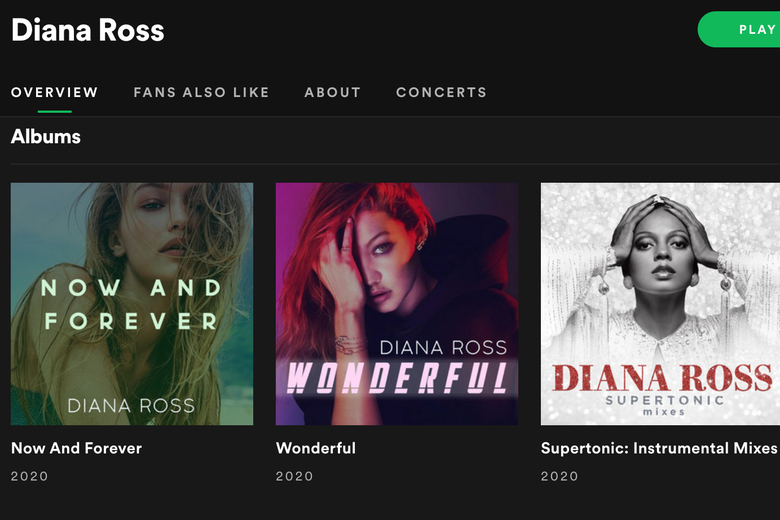

These albums can no longer be found on the Diana Ross’ Spotify page. But while they were there, the music was attributed to an outfit called Star Records. The only link between Diana Ross and that label name I could find was this YouTube video, a poor-quality, karaokelike lyric video for a tinny cover of the song “Home” from the movie musical The Wiz (which starred the real Ross). The channel that uploaded it, “ZR,” features a few other Diana Ross covers as well as other karaoke-style videos that sound similarly shoddy.
Turns out, there really is a Star Records, a Philippines-based record label that’s now called Star Music. The company and its subsidiaries represent several prominent Filipino musicians and run multiple record labels. It also previously had a video branch that produced video karaoke clips, or “videoke.” There’s a karaoke compilation from 2008 that’s listed under Star Records on Discogs, as well as a compilation of covers of American songs that’s been listed on a Japanese website for Filipino entertainment and uploaded as a YouTube playlist, featuring the cover of Ross’ “Home.”
There’s no other sign of the albums that appeared on Spotify, however. Before those were removed, I did listen, and they were neither karaoke nor Filipino pop; rather, they sounded like insipid elevator music. So I can’t say for sure whether those were the work of the overseas label (which did not respond to my request for comment). All I know is that “Star Records,” like me, loves Diana Ross.
In early March, a song appeared on my Release Radar by a rapper named Son Diezel; it popped up because it apparently featured the classic rap posse Bone Thugs-N-Harmony. As you can see, the song credited Bone Thugs using the group’s preferred styling.
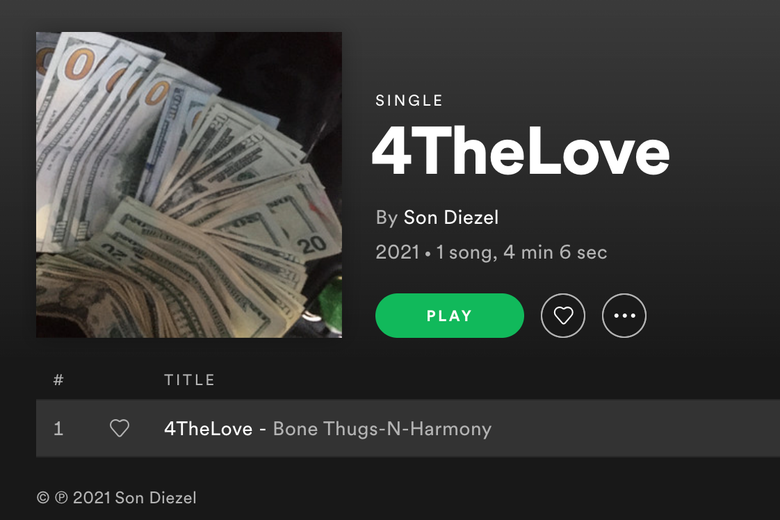

If you look now at “4TheLove,” you’ll find the group is no longer featured on it. Instead, the guest is still credited as “Bone Thugs And Harmony” (with a capital A), with a link to an artist page that doesn’t have any other songs.
I reached out to the Louisiana-based Son Diezel, and he gamely explained the situation to me. His track samples the Bone Thugs song “Foe tha Love of $,” which he says he didn’t clear with the group. But when he uploaded his music to Spotify, he did put Bone Thugs-N-Harmony as the featured artist “so that I wouldn’t get copyright infringement.” He said that until I called him, he didn’t know someone had changed the formatting of his Bone Thugs feature and removed the direct connection to the actual group.
Diezel described his method to me: sampling a song in his own music and publicly crediting the sampled artist as a featured guest. “The first song I uploaded with a sample, I sampled Protoje, a reggae artist from Jamaica. I made a beat with one of his songs—you can’t tell he’s in it, but I sampled him—and when I uploaded the song, I gave him his credit so that I wouldn’t get copyright infringement. I put him as the featured artist. That was the first song that I’ve seen on my profile that spiked up out of nowhere. That was one of the first songs that had a feature on the Release Radar.” In other words, he wasn’t getting many streams until his music Spotify misleadingly flagged this song, titled “Afterlife,” for Protoje fans.
Here’s why Diezel did what he did: The distribution service he uses to place music on Spotify and elsewhere, UnitedMasters, didn’t allow him to upload many songs to Spotify due to uncleared samples. But when he added the featured artist credits on the songs that sampled them, the uploads went through. “So I just continued to try that,” he told me. In addition to Protoje and Bone Thugs, he also sampled a song by R&B singer Raury. Diezel acknowledged that this strategy helped get more streams: “Was it weird for me to see my shit shoot up like that? It wasn’t. I anticipated that. I’m not sure how that works, but it went through.”
So far, Spotify hasn’t removed any of the tracks that credit artists whose samples Diezel has not officially cleared. However, if you check out Diezel’s songs that “feature” Protoje, you’ll find the featured listings no longer link to Protoje’s official profile, but to a separate page with the same name, wherein you can see all the Son Diezel songs the artist is “featured” on. The song sampling Raury, “Savior,” still links to Raury’s verified profile and can be seen on Spotify’s “This Is Raury” playlist.
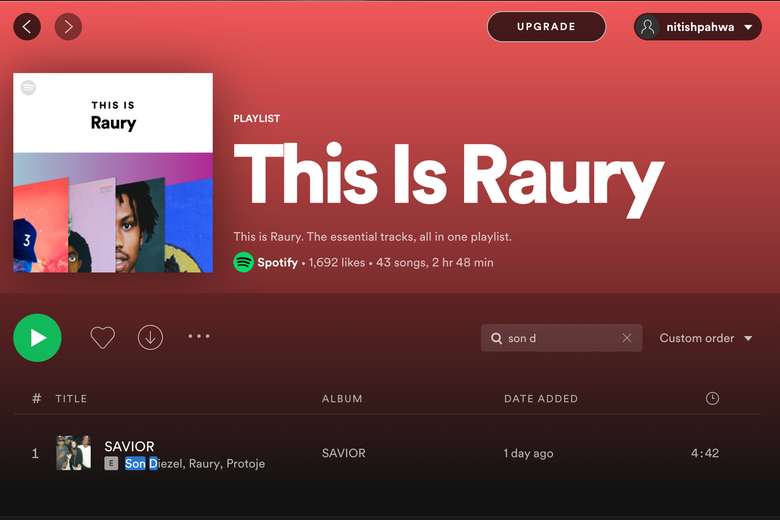

I asked Diezel if the money he earns from these streams gets split among him and the featured artists. He confessed he didn’t know how it works but that he did want his “featured artists” to get what they’re owed, since they inspired his work.
Also back in March, my Release Radar recommended a new song by Big L, the influential Harlem MC who was shot and killed in 1999. Obviously it wasn’t him, and the track, titled “AiCo,” is electronica, not grimy boom-bap. There are other EDM-ish songs on the new Big L’s profile, and this artist has a verified page that’s separate from the one belonging to the original Big L (bio: “Call me L”). I found the YouTube video for “AiCo,” which was uploaded by an account named “Mr. Argonaut.” The channel’s other uploads include videos for all the songs that are on the Spotify for “Big L.”
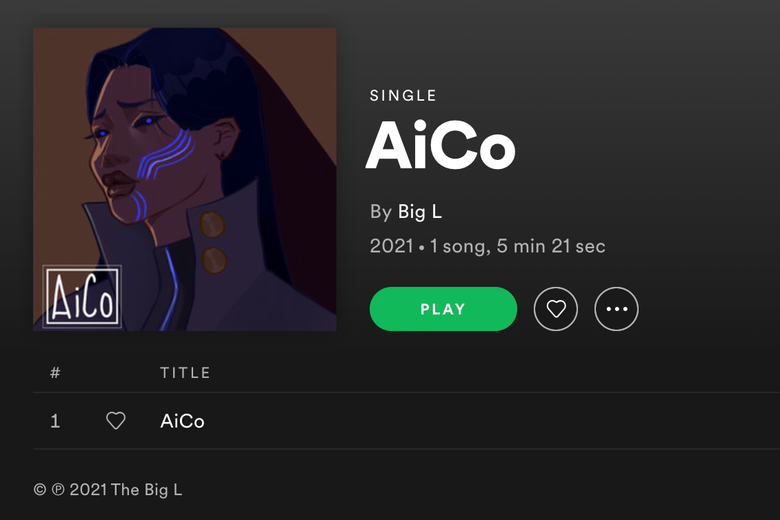

I found Mr. Argonaut/Big L on Twitter and reached out; he then invited me to his private Discord server, where we spoke in a special interview channel. According to the Dallas-based artist, who preferred to keep using pseudonyms, it was a genuine misunderstanding that got out of his control.
“ ‘The Big L’ actually originated because my name used to be ‘LYMGY,’ which was a family saying standing for ‘love you more, got you,’ ” the artist told me. “One of my friends said, ‘That’s pretty hard to pronounce, and it doesn’t roll off the tongue. What about ‘The Big L?’ ” He said individuals representing the estate of the rapper Big L recently sent him a cease-and-desist letter saying the name is trademarked: “I’m now having to undergo a brand change, and I’m changing over to Mr. Argonaut,” a moniker inspired by his love of Greek mythology. Plus, he received an email from UnitedMasters, which he also uses to distribute his music, “saying that I couldn’t publish any more music under that name.”
I asked the former Big L if he had been aware of the original Big L at all, and he said no; he wasn’t even alive when L was murdered. Why was he still listed as Big L on Spotify? “It takes approximately, [UnitedMasters] said, two weeks to get it changed on there,” the newly christened Mr. Argonaut told me. He’s still waiting for the name change to go through; until it does, he apparently can’t upload new music to Spotify. He told me he’s emailed UnitedMasters multiple times asking when the switch will go through and never heard back. (UnitedMasters did not respond to my request for comment on either Son Diezel’s or Argonaut’s situation.)
Having the same name as a beloved rapper may have gotten Mr. Argonaut some streams, but it wasn’t a happy experience, he said: “When I released it, it got put onto Big L’s Spotify page as one of his new songs. I got about 200 different people threatening me, cussing me out. They were coming to my personal YouTube page where I had posted a video on the song. And YouTube took down around 200 hate comments. … [My song] was on his official verified Spotify channel for a good four days before they finally took it off and put it on my own profile.”
In general, Argonaut explained, it’s difficult for a smaller artist like himself to navigate Spotify’s vast system. So he uses UnitedMasters’ mobile app to upload his songs. “I don’t get to talk to anybody. You just enter it into the system,” he said. “You put in your title, your cover art, and your genre, and you add the audio file. And then you have to specify whether it’s explicit/clean, lyrics if it has lyrics, and then they send it in—you have to schedule it a week in advance—and they go through the song, see if it’s pirating music from other songs and that you’re not labeling it as a remix, and once they get done with that, they’ll take around two or three business days, then they go ahead and approve it for release.”
This has its drawbacks. A help page on UnitedMasters’ site explains that you can ensure your music goes on the correct artist page by choosing your streaming profile from a menu. “AiCo” ended up on the original Big L’s page because it was Mr. Argonaut’s first upload, he says. Meanwhile, Spotify’s “Spotify for Artists” resources explain that if your music has been mixed up with someone else’s, you should contact your distributor. The company has a list of “preferred and recommended providers” that “meet our standards for delivering music to our platform,” a list on which UnitedMasters is nowhere to be found.
What has Mr. Argonaut earned from Spotify after all this trouble? For “AiCo,” which has nearly 40,000 streams, the artist said, “I’m only going to be getting around $100.”
The music industry has almost always had a fakeness problem. In the late 1960s, after the psychedelic pop band the Zombies broke up, there were two impostor bands touring America pretending to be the group behind “Time of the Season.”
But the issue of phony artists has become even more complicated and disorienting in the digital era, from mislabeled files on piracy sites to straight-up streaming service deceit, in which uploaders try to earn royalties by posting unauthorized recordings by famous artists.
Mostly by paying attention to my Release Radar, I’ve collected a bunch of same-name artists in recent months, including a Brazilian artist going by the Lox (not to be confused with the rap trio the LOX). What strikes me is how often these mix-ups happen on Spotify, which has an inescapable grip over a brittle music industry. More than any of its competitors, the platform dictates which artists get boosted, how, and when, often automating that process. As a result, things get weird. Musicians have found no shortage of ways to bamboozle the system, from all-silent albums to trick playlists to fake features made possible with cooked-up metadata. Once, actions like these could be fodder for harmless pranks—in 2016, comedian Dan Bull racked up hundreds of thousands of streams on the platform by releasing a joke album titled The Life of Pablo after Kanye West said his album of the same name would only stream on Tidal (that exclusivity didn’t last long).
In one sense, it’s exciting that a kid named Big L who’s too young to know about the original Big L is able to get his music everywhere—and get paid—by using an app. But the constant bafflement and algorithmic hiccups that come with Spotify suggest something sinister, too. We haven’t dispensed with music’s gatekeepers—we’ve just replaced them with worse gatekeepers (who happen to be partially owned by the old gatekeepers).
What can you do about it? Perhaps just report the fakes, find other ways to support the artists you love, and hope that an actual new DJ Quik release will happen soon.
"artist" - Google News
May 10, 2021 at 04:55PM
https://ift.tt/33sOp3G
The Artist Impostors of Spotify - Slate
"artist" - Google News
https://ift.tt/2FwLdIu
Bagikan Berita Ini














0 Response to "The Artist Impostors of Spotify - Slate"
Post a Comment